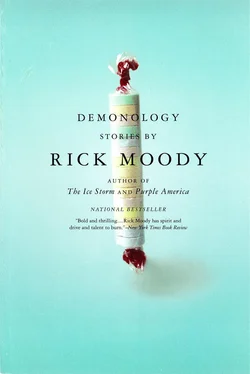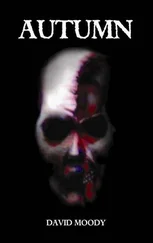They were heading for the next property over, probably which was not a private residence, but, rather, the grounds belonging to the Cherry Lawn School. An alternative school, noteworthy for its accumulation of boys with long unwashed hair and acne who dotted the front steps of the administrative building smoking cigarettes. Gerry’s mother thought the school was fabulous, because it was so much like a minimum-security penitentiary, but apparently it didn’t make any money, and was therefore doomed. Moreover, the Cherry Lawn School was a zoning nightmare, and it provided known drug addicts with an address at which to receive shipments of controlled substances which they then passed on to impressionable young persons of Darien. There was a tennis court in front of the Cherry Lawn School upon which no one had ever, to Gerry’s knowledge, played a single set of tennis. There was a tetherball court with grass growing through its tarmac. The young men of Cherry Lawn, meanwhile, were like the greyhound starvelings of the Foster Mansion and Plantation, and they fed these animals with whatever institutional food was offered at the Cherry Lawn School, Swedish meatballs, Salisbury steak, chicken teriyaki, pizza squares, tuna casserole, minute rice. One of the greyhounds was called Warren G. Harding; one was called Zachary Taylor, one was called Franklin Pierce. Gerry was pretty sure there was also a William Henry Harrison and a Millard Filmore. In this way, the young men of Cherry Lawn learned about the less-well-known presidents, as it was these presidents who most interested the Fosters, a family bent on assembling a complete set of presidential dogs. What breed would you choose for James Earl Carter? Miniature schnauzer?
Gerry and Julian arrived at the house itself. As you know, George Sheldon, historian and popularizer, described the house in his Artistic Country Seats, dwelling at some length on its effect of length and lowness; the finishing of the great hall in immemorial pine. Next to Dutch doors of the south side are transomed English basement windows. Above the mantel in the parlor sits a large hood supported by four brackets whose intervening spaces each show a lion triumphant in relief and so forth. Designed in the Shingle Style by Lamb and Rich in 1885, not long after their completion of the Hinckley commission on Long Island. The Foster home betrayed its influence. The main entrance at the end of the walkway required passage onto a luxurious porch that sleeved the residence on three sides: the den, the dining room, the hall, the parlor, and the pantry, where the most magnificent face of the porch, fitted out in unavoidable rattan porch furniture, overlooked the Fosters’ Illyrian waterfall. But here, where Gerry stood, in the front, was the intended entrance. However, no one answered when the two of them called at the front door. There was the warbling of a convex piece of vinyl, Linda Ronstadt, distantly. They pushed their way inside. The screen door swung shut behind them as if controlled from the spirit world. The hall was lit only in candles, but not the sort that you got in a dozen box at your department store. These were altar candles from northeastern Protestant churches, where Gerry had occasionally been as a young boy, during the interval in which his mother attempted to give him a range of denominational experiences, so that he would better understand the social ideology of his peers, so that he could better make up his mind later in life about the contested space of American spiritual experience. What he figured out during this period was that the dispossession of American Judaism was native to his spirits. He was a Jewish boy. He ascribed to the religion of a people who didn’t belong anywhere, unless you counted the promises on some mystic scroll. Gerry’s United States of America was a Jewish country, because it was a nation of people cast wide, like seed cases, in some awesome planting, broadcast upon gales.
He grew accustomed to the trembling candlelight, to the stillness of the main hall, to the conflagration likewise dancing in a walk-in fireplace there, and then he noticed that there was a headless man in the foyer. A man holding his own head. A man wearing clerical garb of Puritan faith, holding a bloody head with stump under one arm. A specter who now broke the silence in an eerie and familiar voice to speak to the two of them.
— You aren’t wearing costumes either? How come nobody’s wearing any costumes? Its Halloween. Don’t you kids have any fun? The whole point of Halloween is to wear a costume.
The groundskeeper. Gerry knew his son. The kid was an athlete, the Platonic ideal thereof, a halfback with a strong need to assault others. This kid only had one eye. Nate, that was this kid’s name, would show you his eye socket, too, pin you down in some corridor, if he really wanted to intimidate you. He’d wanted to intimidate Gerry a number of times, so now Gerry knew exactly what an eye socket looked like: the surface of Mars, pinky-yellow with red irrigations, much adorned with encrustments and green slime. The same information was confirmed by a friend of a friend of a friend who had also seen it. Everybody talked about Nate’s eye socket. And maybe the dismembered head that his dad carried under his arm, tonight, with the fake blood all over it, was an evocation of the part of Nate’s dad of the day when he had to come back home one afternoon to find that the boy had lanced a baby blue, playing with a plastic sword ordered from a cereal manufacturer. Or maybe it was just that Old Man Foster preferred his groundskeeper to wear a ridiculous costume on Halloween, indicating class difference, even though Nick Foster had no interest in costumes at all and didn’t want any kind of costume party. Mr. McGloon, the groundskeeper, had the cassock up over his actual head and was therefore peeking through the space between buttonholes:
— Your friends are already leaving, I think.
— We didn’t see anyone leaving. We saw some girls coming in, Peltz said. Julian often contradicted persons of authority, even when it was inadvisable to do so. It made Gerry want to get the hell away from him sometimes.
The headless clergyman, weary from labors, sank onto the divan beside the fireplace. He pointed, wordlessly, to the three porcelain bowls that were laid out, with cheesecloth draped across their mouths, on a Shaker sideboard. Though the main hall was noteworthy for its absence of activity, Gerry nonetheless glimpsed the retreat of a pair of toe shoes near the top of the great staircase. Candles trembled anew. A pedal steel guitar shivered in the backdrop of the distant Linda Ronstadt album.
— This is the part where we touch the cold pasta and it’s supposed to feel like brains, Julian said. — Or is it pasta that’s supposed to feel like intestines? Or Jell-O that’s supposed to feel like a liver, right? I can’t remember. Anyway, it’s foods you’d find anywhere. You’re meant to believe they’re guts.
— Just go on in, McGloon said wearily to Peltz. The groundskeeper’s flushed visage now protruded from the neck-hole of his vestment. He gazed away from the boys, through the window by the divan. Across a colonnaded porch.
Peltz nodded dismissively. And then he uttered the words that would become pivotal in any midlife recollection of the Fosters’ Halloween party. — I’ll be right back. Nature calls.
He gestured in the direction of a theoretical half-bath under the staircase, as if he already knew the layout. In the sinister light of candelabras, space and design were in the eye of the beholder. Sure there was a bathroom, next to that secret passageway there. And maybe this door, to the right, led to the dining room, maybe not. He would wait for Peltz there. Was this the true location of the party then? Was this to be its epicenter? It was a question asked across the recent decades of polite society with increasing vehemence. Parties, according to most celebrants, had to have a centermost emanation, a spot of perfect celebration, over and through and above the hang-ups and put-downs that always threatened a party. A popular theory indicated that the center of the party was always identical with a particular person — Danny Henderson, for example, the guy from up the street who never took anything seriously. Not even one thing. Henderson had never been known to make any utterance but that it was at the expense of some poor classmate. When you were with him, you had best not take anything seriously either. By this hour, Henderson would have cast off his regulation outfit; he would be wearing only the bearskin rug from the parlor next door, like Marianne Faithful during the Stones bust. He would be mooning kids from the debating team. Therefore, according to this first theory, the center of the party was a particular person, and all good times were his or hers to execute, as puppeteer works the strings of marionette. Yet a competing theory held that the center of the party was always a room. The room, for example, where two guys were reciting entire recordings by a certain British improvisational comedy troupe. Passing a joint between them. Everyone was laughing. This isn’t Argument! This is Abuse! Or maybe the room where a snaking line of white girls attempted to do a version of a dance entitled the Bus Stop to the Linda Ronstadt recording or to its successors. Any of the rooms in Grasslands, which was the name of the Foster residence (there were some good jokes about that!), was liable to be the center of the party, because they were all impressive spaces. However, according to yet another theory (this elaborated by a minor writer of the Prague School), the center of the party was neither inherent in person, nor in place; it was located, rather, in mood. As it happened, the mood was frequently intoxication, the obliteration of day’s cares in the here and now of drink. Genuine Miller Drafts were stashed in an additional refrigerator, in the basement, by the billiards table. Children loitered there. Think of the feeling of a thirteen-year-old, forbidden by his uptight folks to consume any such fermented beverage as he reached into the refrigerator for the first can. His algebra homework far from his mind. The difference between compliment and complement far from his mind. The Emancipation Proclamation far from his mind. He was at the center of the party, because he was intoxicated. And it was good.
Читать дальше












